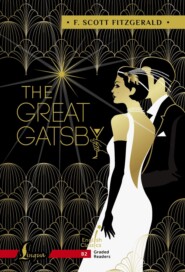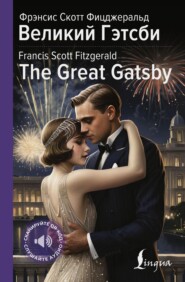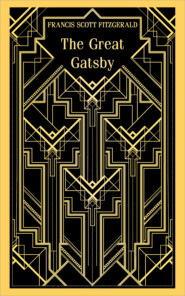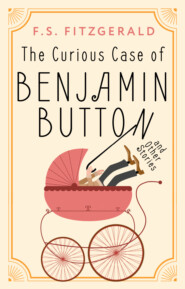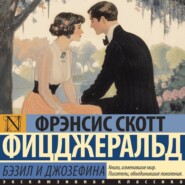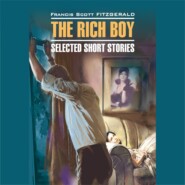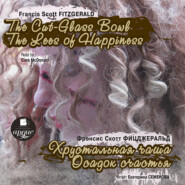По всем вопросам обращайтесь на: info@litportal.ru
(©) 2003-2025.
✖
Сборник лучших произведений американской классической литературы. Уровень 4
Настройки чтения
Размер шрифта
Высота строк
Поля
“I don't think it's so much THAT[36 - I don't think it's so much that. – Не думаю, что дело в этом.],” argued her friend. “It's more that he was a German spy during the war.”
“Oh, no,” said the first girl. “I'll bet he killed a man.”
I tried to find the host. Champagne was served in glasses bigger than finger bowls.
The moon had risen higher. I was still with Jordan Baker. We were sitting at a table with a man of about my age. I was enjoying myself now. I had taken two finger-bowls of champagne and the scene had changed before my eyes into something significant, elemental and profound.
The man looked at me and smiled.
“Your face is familiar,” he said, politely. “Weren't you in the Third Division during the war?”
“Why, yes.”
“Oh! I knew I'd seen you somewhere before.”
He told me that he had just bought a hydroplane and was going to try it out in the morning.
“Want to go with me, old sport[37 - old sport – старина]?”
“What time?”
“Any time that suits you best.”
“This is an unusual party for me. I haven't even seen the host. This man Gatsby sent over his chauffeur with an invitation.”
For a moment he looked at me as if he failed to understand.
“I'm Gatsby,” he said suddenly.
“What!” I exclaimed. “Oh, I beg your pardon.”
“I thought you knew, old sport. I'm afraid I'm not a very good host.”
He smiled understandingly – much more than understandingly. It was one of those rare smiles with a quality of eternal reassurance in it, that you may come across[38 - come across – встретить] four or five times in life. It faced – or seemed to face – the whole external world for an instant, and then concentrated on YOU with an irresistible prejudice in your favor. It understood you just so far as you wanted to be understood, believed in you as you would like to believe in yourself and assured you that it had precisely the impression of you that, at your best, you hoped to convey. Precisely at that point it vanished – and I was looking at an elegant young rough-neck, a year or two over thirty, whose elaborate formality of speech just missed being absurd. Some time before he introduced himself I'd got a strong impression that he was picking his words with care.
Almost at the moment when Mr. Gatsby identified himself a servant hurried toward him with the information that Chicago was calling him on the wire. He excused himself with a small bow.
“If you want anything just ask for it, old sport,” he urged me. “Excuse me. I will rejoin you later.”
When he was gone I turned immediately to Jordan.
“Who is he?” I demanded. “Do you know?”
“He's just a man named Gatsby.”
“Where is he from, I mean? And what does he do?”
“Well, he told me once he was an Oxford man[39 - He was an Oxford man. – Он учился в Оксфорде.]. However, I don't believe it.”
“Why not?”
“I don't know,” she insisted, “I just don't think he went there. Anyhow he gives large parties. And I like large parties. They're so intimate. At small parties there isn't any privacy.”
Jordan Baker instinctively avoided clever men. She was incurably dishonest[40 - incurably dishonest – неисправимо бесчестна]. But dishonesty in a woman is a thing you never blame deeply. Every one suspects himself of at least one of the cardinal virtues, and this is mine: I am one of the few honest people that I have ever known.
Chapter 4
On Sunday morning while church bells rang in the villages along shore everybody returned to Gatsby's house.
“He's a bootlegger[41 - bootlegger – бутлегер (подпольный торговец спиртным во время сухого закона в США)],” said the young ladies, moving somewhere between his cocktails and his flowers. “One time he killed a man who had found out that he was second cousin to the devil. Reach me a rose, honey, and pour me a last drop into that there crystal glass.”
At nine o'clock, one morning late in July Gatsby's gorgeous car lurched up the rocky drive to my door. It was the first time he had called on me though I had gone to two of his parties, mounted in his hydroplane, and, at his urgent invitation, made frequent use of his beach.
“Good morning, old sport. You're having lunch with me today and I thought we'd ride up together.”
He was balancing himself on the dashboard of his car with that resourcefulness of movement that is so peculiarly American – that comes, I suppose, with the absence of lifting work or rigid sitting in youth and, even more, with the form- less grace of our nervous, sporadic games. This quality was continually breaking through his punctilious manner in the shape of restlessness. He was never quite still; there was always a tapping foot somewhere or the impatient opening and closing of a hand.
He saw me looking with admiration at his car.
“It's pretty, isn't it, old sport.” He jumped off to give me a better view. “Haven't you ever seen it before?”
I'd seen it. Everybody had seen it. It was a rich cream color, bright with nickel, swollen here and there in its monstrous length with triumphant hatboxes and supper-boxes and tool-boxes, and terraced with a labyrinth of windshields that mirrored a dozen suns. Sitting down behind many layers of glass in a sort of green leather conservatory we started to town.
I had talked with him perhaps half a dozen times in the past month and found, to my disappointment, that he had little to say. So my first impression, that he was a person of some undefined consequence, had gradually faded and he had become simply the proprietor of an elaborate roadhouse next door.
And then came that disconcerting ride. We hadn't reached West Egg village before Gatsby began leaving his elegant sentences unfinished and slapping himself indecisively on the knee of his caramel-colored suit.
“Look here, old sport,” he broke out surprisingly. “What's your opinion of me, anyhow?”
A little overwhelmed, I began the generalized evasions which that question deserves.
“Well, I'm going to tell you something about my life,” he said. “I don't want you to get a wrong idea of me from all these stories you hear. I am the son of some wealthy people in the middle-west – all dead now. I was brought up in America but educated at Oxford because all my ancestors have been educated there for many years. It is a family tradition.”
He looked at me sideways – and I knew why Jordan Baker had believed he was lying. He hurried the phrase “educated at Oxford”, or swallowed it or choked on it as though it had bothered him before. And with this doubt his whole statement fell to pieces and I wondered if there wasn't something a little sinister about him after all.
“What part of the middle-west?” I inquired.
“San Francisco. My family all died and I came into a good deal of money[42 - I came into a good deal of money. – Мне досталось большое состояние.]. After that I lived in all the capitals of Europe – Paris, Venice, Rome – collecting jewels, chiefly rubies, hunting, painting a little.”
His voice was solemn as if the memory of that sudden extinction of a clan still haunted him. For a moment I suspected that he was pulling my leg but a glance at him convinced me otherwise.
With an effort I managed to restrain my incredulous laughter. The very phrases were worn so threadbare that they evoked no image except that of a turbaned “character” leaking sawdust at every pore as he pursued a tiger through the Bois de Boulogne.
“Then came the war, old sport. It was a great relief and I tried very hard to die but I seemed to bear an enchanted life. I was promoted to be a major[43 - was promoted to be a major – был произведён в майоры]. Here's a thing I always carry. A souvenir of Oxford days.”
It was a photograph of young men. There was Gatsby, looking a little, not much, younger – with a cricket bat in his hand.
Then it was all true.
“Oh, no,” said the first girl. “I'll bet he killed a man.”
I tried to find the host. Champagne was served in glasses bigger than finger bowls.
The moon had risen higher. I was still with Jordan Baker. We were sitting at a table with a man of about my age. I was enjoying myself now. I had taken two finger-bowls of champagne and the scene had changed before my eyes into something significant, elemental and profound.
The man looked at me and smiled.
“Your face is familiar,” he said, politely. “Weren't you in the Third Division during the war?”
“Why, yes.”
“Oh! I knew I'd seen you somewhere before.”
He told me that he had just bought a hydroplane and was going to try it out in the morning.
“Want to go with me, old sport[37 - old sport – старина]?”
“What time?”
“Any time that suits you best.”
“This is an unusual party for me. I haven't even seen the host. This man Gatsby sent over his chauffeur with an invitation.”
For a moment he looked at me as if he failed to understand.
“I'm Gatsby,” he said suddenly.
“What!” I exclaimed. “Oh, I beg your pardon.”
“I thought you knew, old sport. I'm afraid I'm not a very good host.”
He smiled understandingly – much more than understandingly. It was one of those rare smiles with a quality of eternal reassurance in it, that you may come across[38 - come across – встретить] four or five times in life. It faced – or seemed to face – the whole external world for an instant, and then concentrated on YOU with an irresistible prejudice in your favor. It understood you just so far as you wanted to be understood, believed in you as you would like to believe in yourself and assured you that it had precisely the impression of you that, at your best, you hoped to convey. Precisely at that point it vanished – and I was looking at an elegant young rough-neck, a year or two over thirty, whose elaborate formality of speech just missed being absurd. Some time before he introduced himself I'd got a strong impression that he was picking his words with care.
Almost at the moment when Mr. Gatsby identified himself a servant hurried toward him with the information that Chicago was calling him on the wire. He excused himself with a small bow.
“If you want anything just ask for it, old sport,” he urged me. “Excuse me. I will rejoin you later.”
When he was gone I turned immediately to Jordan.
“Who is he?” I demanded. “Do you know?”
“He's just a man named Gatsby.”
“Where is he from, I mean? And what does he do?”
“Well, he told me once he was an Oxford man[39 - He was an Oxford man. – Он учился в Оксфорде.]. However, I don't believe it.”
“Why not?”
“I don't know,” she insisted, “I just don't think he went there. Anyhow he gives large parties. And I like large parties. They're so intimate. At small parties there isn't any privacy.”
Jordan Baker instinctively avoided clever men. She was incurably dishonest[40 - incurably dishonest – неисправимо бесчестна]. But dishonesty in a woman is a thing you never blame deeply. Every one suspects himself of at least one of the cardinal virtues, and this is mine: I am one of the few honest people that I have ever known.
Chapter 4
On Sunday morning while church bells rang in the villages along shore everybody returned to Gatsby's house.
“He's a bootlegger[41 - bootlegger – бутлегер (подпольный торговец спиртным во время сухого закона в США)],” said the young ladies, moving somewhere between his cocktails and his flowers. “One time he killed a man who had found out that he was second cousin to the devil. Reach me a rose, honey, and pour me a last drop into that there crystal glass.”
At nine o'clock, one morning late in July Gatsby's gorgeous car lurched up the rocky drive to my door. It was the first time he had called on me though I had gone to two of his parties, mounted in his hydroplane, and, at his urgent invitation, made frequent use of his beach.
“Good morning, old sport. You're having lunch with me today and I thought we'd ride up together.”
He was balancing himself on the dashboard of his car with that resourcefulness of movement that is so peculiarly American – that comes, I suppose, with the absence of lifting work or rigid sitting in youth and, even more, with the form- less grace of our nervous, sporadic games. This quality was continually breaking through his punctilious manner in the shape of restlessness. He was never quite still; there was always a tapping foot somewhere or the impatient opening and closing of a hand.
He saw me looking with admiration at his car.
“It's pretty, isn't it, old sport.” He jumped off to give me a better view. “Haven't you ever seen it before?”
I'd seen it. Everybody had seen it. It was a rich cream color, bright with nickel, swollen here and there in its monstrous length with triumphant hatboxes and supper-boxes and tool-boxes, and terraced with a labyrinth of windshields that mirrored a dozen suns. Sitting down behind many layers of glass in a sort of green leather conservatory we started to town.
I had talked with him perhaps half a dozen times in the past month and found, to my disappointment, that he had little to say. So my first impression, that he was a person of some undefined consequence, had gradually faded and he had become simply the proprietor of an elaborate roadhouse next door.
And then came that disconcerting ride. We hadn't reached West Egg village before Gatsby began leaving his elegant sentences unfinished and slapping himself indecisively on the knee of his caramel-colored suit.
“Look here, old sport,” he broke out surprisingly. “What's your opinion of me, anyhow?”
A little overwhelmed, I began the generalized evasions which that question deserves.
“Well, I'm going to tell you something about my life,” he said. “I don't want you to get a wrong idea of me from all these stories you hear. I am the son of some wealthy people in the middle-west – all dead now. I was brought up in America but educated at Oxford because all my ancestors have been educated there for many years. It is a family tradition.”
He looked at me sideways – and I knew why Jordan Baker had believed he was lying. He hurried the phrase “educated at Oxford”, or swallowed it or choked on it as though it had bothered him before. And with this doubt his whole statement fell to pieces and I wondered if there wasn't something a little sinister about him after all.
“What part of the middle-west?” I inquired.
“San Francisco. My family all died and I came into a good deal of money[42 - I came into a good deal of money. – Мне досталось большое состояние.]. After that I lived in all the capitals of Europe – Paris, Venice, Rome – collecting jewels, chiefly rubies, hunting, painting a little.”
His voice was solemn as if the memory of that sudden extinction of a clan still haunted him. For a moment I suspected that he was pulling my leg but a glance at him convinced me otherwise.
With an effort I managed to restrain my incredulous laughter. The very phrases were worn so threadbare that they evoked no image except that of a turbaned “character” leaking sawdust at every pore as he pursued a tiger through the Bois de Boulogne.
“Then came the war, old sport. It was a great relief and I tried very hard to die but I seemed to bear an enchanted life. I was promoted to be a major[43 - was promoted to be a major – был произведён в майоры]. Here's a thing I always carry. A souvenir of Oxford days.”
It was a photograph of young men. There was Gatsby, looking a little, not much, younger – with a cricket bat in his hand.
Then it was all true.






